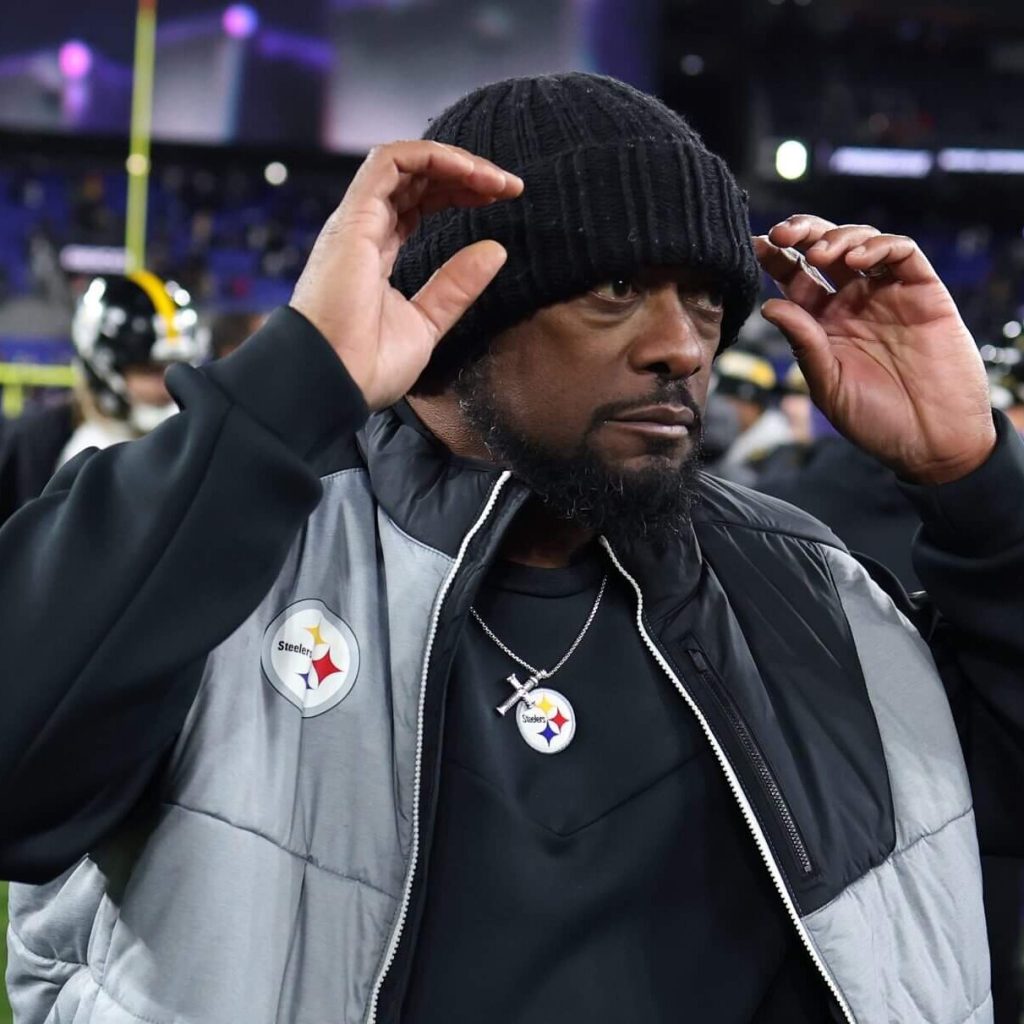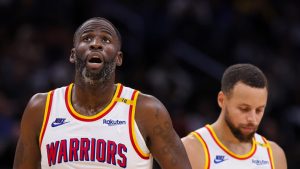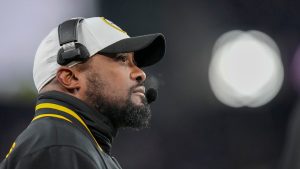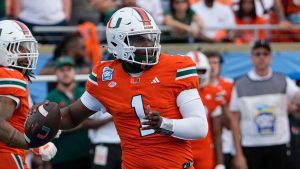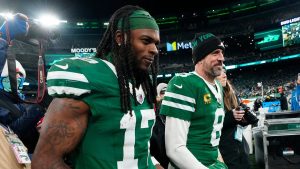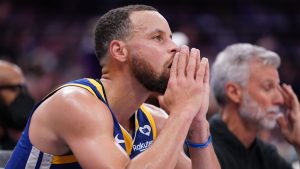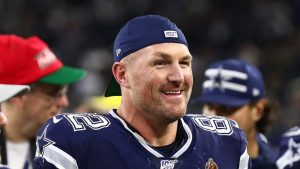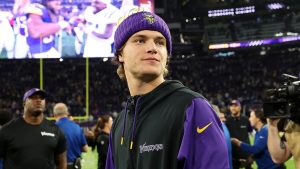After early playoff exits, several teams face pressing questions.
The NFL’s divisional playoff round is fast approaching, which means vacation time is here for the Pittsburgh Steelers.
It’s become a habit for a flagship franchise with six Lombardi Trophies but the same number of playoff victories as the New York Jets over the past eight seasons: zero.
The Steelers’ inevitable 28-14 defeat to the Baltimore Ravens in the wild-card round Saturday extended the franchise’s longest stretch without a playoff victory since the 1972 team, led by 40-year-old coach Chuck Noll, scored the first postseason win in team history.
GO DEEPER
Embarrassed by Ravens and stuck in purgatory, the Steelers must ponder significant changes
Coach Mike Tomlin’s streak of 18 consecutive non-losing seasons cannot mask the erosion of real championship aspirations in Pittsburgh. Is Tomlin, now 16 years removed from his Super Bowl victory over Arizona, holding back the Steelers? Is it the other way around? How about both?
The Pick Six column answers the most pressing questions regarding the longest-tenured coach in the NFL and the franchise he has led since 2007. There’s much more to this story than the obvious. A wider view helps make sense of it all. The full menu this week:
• What’s wrong with Tomlin, Steelers
• What the Packers should do next
• A mistake to avoid when hiring coaches
• Takeaways from Justin Herbert’s loss
• How Broncos can take the next step
• 2-minute drill: Commanders come through
1. Is Mike Tomlin holding back the Steelers? Is it the other way around? How about both?
During their first 10 seasons under Tomlin (2007-16), the Steelers ranked tied for fifth with eight postseason victories. They are one of eight teams without a playoff victory since then, a span of eight seasons.
Also on the list after the Washington Commanders beat the Tampa Bay Buccaneers on Sunday night for their first playoff victory in nearly two decades: the Arizona Cardinals (nine-year drought), Carolina Panthers (nine), Denver Broncos (nine), Chicago Bears (14), Jets (14), Las Vegas Raiders (22) and Miami Dolphins (24). Not the type of company the Steelers are accustomed to keeping.
Tomlin kept winning, but stopped contending
No. of seasons
10
8
Reg. W-L-T
103-57
80-50-2
Reg. wins
103 (3rd)
80 (5th)
Reg. win %
.644 (3rd)
.614 (5th)
Post. W-L
8-6
0-5
Post. wins
8 (T-5th)
0 (T-25th)
Post. win %
.571 (9th)
.000 (T-25th)
What happened?
During those first 10 seasons under Tomlin, the Steelers had a Hall of Fame owner (Dan Rooney), a proven general manager (Kevin Colbert), an upper-tier quarterback (Ben Roethlisberger) and a top coach (Tomlin) at the same time.
Rooney died before the 2017 season. Roethlisberger missed almost all of the 2019 season due to injury and wasn’t the same upon his return. He played two more years and retired. Colbert also retired after the 2021 season.
Tomlin remained as the last pillar from those peak years. Remove him and the organization might collapse. Leave him in place and you might be signing up for more of the same, unless the Steelers can find an upper-tier quarterback. Everything changes then. What are the odds they find one picking 21st in the order this April, one spot later than where they selected Kenny Pickett three years ago? The chances might be low even if they were picking earlier.
“They play a risk-averse brand, and they let the defense do it for them,” a coach from another team said. “What does that get you? Playoff entrance and a first-round loss. Then you criticize Tomlin and say he’s holding them back. But that’s how it is with every other team that drafts a quarterback in the first round that does not pan out.”
Despite missing on Pickett in 2022, the Steelers under Tomlin are the only NFL team to exceed its regular-season Vegas win total in each of the past five seasons, per Pro Football Reference. This explains how Pittsburgh’s regular-season winning percentage over the past eight seasons (.614) approximates the win rate (.644) during those first 10.
The postseason results prove it’s a mirage.
This paradox is a testament to Tomlin and the frustration of his tenure. It’s how a case can be made that Tomlin raises the Steelers’ floor while lowering their ceiling.
“They are successful because they don’t change, and they can’t win a playoff game because they don’t change,” an opposing coach said.
An exec from another team praised Tomlin as a leader while questioning staff-related decisions, from carrying Matt Canada as offensive coordinator for three seasons (2021-23) to playing a straightforward brand of ball overall.
“When is the last time we have praised their game planning or design?” this exec asked.
Retired NFL quarterback Alex Smith suggested on ESPN that the Steelers were running an analog offense in a digital age, while sitting back on defense. Pittsburgh also showed no urgency in the fourth quarter against Baltimore, saving its timeouts until the final two minutes while trailing by two touchdowns for a full quarter.
The Steelers went quietly at the end of this game, same as they went quietly in plummeting from 10-3 to 10-7. They ranked 30th in offensive EPA per play and 25th on the defensive side over the final four games of the regular season. They allowed 300 yards rushing against the Ravens on Saturday before a Lamar Jackson kneeldown brought the total to 299.
This was the sixth consecutive playoff defeat in which the Steelers trailed by at least 21 points. Their opponents in those postseason matchups outscored Pittsburgh by a combined 73-0 in the first quarter. These were total surrenders, not hard-fought battles.
Who within the Steelers will ask the tough questions of the empowered head coach? Not the late Dan Rooney or the retired Colbert. Perhaps it will be owner Art Rooney II, himself a 2025 semifinalist for the Hall of Fame.
“I don’t think the Tomlin trade happens yet, but at some point, it might,” an exec from another team said. “Everybody will disappear for a few days, but then somebody is going to ask about staff changes, and if Tomlin bows up, that is when there could be problems. That’s what happened with Pete Carroll in Seattle last year.”
Carroll, like Tomlin, reached two Super Bowls, winning one, in the first five years of his tenure. He kept winning during the regular season, but after going 9-5 in the playoffs over his first seven seasons in Seattle, Carroll had only one playoff victory to show for his final seven with the team.
All-time NFL wins leader Don Shula once went eight consecutive seasons without a playoff victory during his legendary 26-year coaching run with Miami. He was 53, as Tomlin will be next season, when the streak ended with a trip to the Super Bowl after the 1982 season.
The Dolphins drafted Dan Marino in 1983. Shula remained through his age-65 season, reaching one more Super Bowl, but he had only three playoff victories over his final 10 seasons. Frustrated by the drought, the Dolphins forced out Shula after he refused to make sweeping staff changes.
Miami owns three playoff victories under nine coaches (excluding interim ones) in three decades since Shula reluctantly retired. That includes zero since 2000.
The Steelers do not aspire to that, either, but is the status quo acceptable? That is the Tomlin paradox, nearly a decade in the making.
2. The start and finish of Green Bay’s 22-10 defeat at Philadelphia should stick in the Packers’ minds for different reasons. Will it affect how Green Bay proceeds in the offseason?
• The start: Green Bay owns seven of the NFL’s worst 37 special-teams EPA performances (19 percent) in the playoffs since 2008 despite accounting for only 24 of the 378 individual team postseason appearances (6 percent) over that span, per TruMedia.
The time period covers the Aaron Rodgers and Jordan Love eras at quarterback for a franchise sporting more than its share of big-game special teams scars.
On Sunday, the disappointment included officials’ refusal to reverse the recovery of Keisean Nixon’s fumble of the opening kickoff, despite seemingly ample evidence to do so.
Still, putting the ball at risk on the opening kickoff was brutal for a team featuring a two-time first-team All-Pro kick returner (Nixon) and one of the game’s best-compensated special teams coaches (Rich Bisaccia).
These things happen, especially to the Packers in the playoffs.
GO DEEPER
Why Packers’ loss to Eagles should be no surprise as disappointing season ends
That lost fumble produced a 5.1-point EPA swing, which Philadelphia maximized by scoring a touchdown on its resulting possession. This was huge for the Eagles, who scored only one opening-drive touchdown all season before resting starters in Week 18.
Damaging as the turnover was, this was only the fourth-costliest special teams play for Green Bay in the playoffs since 2008, per TruMedia. The top three: Eric Weems’ 102-yard kickoff return for a touchdown for Atlanta after the 2010 season (-6.1 EPA); Jeremy Ross’ muffed punt against San Francisco after the 2012 season (-5.5); and the blocked punt San Francisco returned for a touchdown after the 2021 season (-5.3).
The table below shows the Packers’ worst special teams EPA games in the playoffs since 2008.
Seattle’s infamous onside-kick recovery in the playoffs after the 2014 season produced a smaller EPA swing (-1.5) because Seattle still had to go 50 yards for a touchdown in the final 2:07, which the Seahawks did, back when the Packers’ defense wasn’t as strong as it proved to be against the Eagles on Sunday.
• The finish: In the end, with Green Bay running low on receivers and Jordan Love struggling to lead the Packers from behind, my mind shifted to one of the biggest differences between the Packers and other NFC contenders.
Even when healthy at wideout, Green Bay lacks established, reliable pass catchers to make the difference in critical situations.
“I want to vomit every time I hear ‘No. 1 receiver,’” LaFleur complained to reporters before the season. “I think we’ve got a bunch of them. Especially those top four guys. They’re capable of being a No. 1 in some capacity.”
That’s a harder sell now.
The Minnesota Vikings count on Justin Jefferson, Jordan Addison and T.J. Hockenson in critical situations. The Detroit Lions trust Amon-Ra St. Brown, Sam LaPorta and, increasingly, Jameson Williams. The Eagles have A.J. Brown, DeVonta Smith and Dallas Goedert. The Los Angeles Rams have Puca Nakua and Cooper Kupp. The Tampa Bay Buccaneers have Mike Evans (and, when healthy, Chris Godwin). Even the Washington Commanders have Terry McLaurin.
The Packers have done as well as could be expected in assembling the NFL’s youngest group of wideouts. The upside is out there someplace in the future if this group grows together. The downside works against making critical plays consistently right now.
Will Christian Watson’s recently torn ACL and Romeo Doubs’ second head injury in quick succession send Green Bay into the veteran market for a higher-end option? The answer was usually “no” when Rodgers was behind center.
3. With the hiring cycle for head coaches gaining momentum, here’s a friendly reminder for teams tempted to chase hot offensive play callers: Do not fool yourselves.
Teams seeking new head coaches absolutely should consider the most successful offensive coordinators. Ben Johnson, Todd Monken, Kliff Kingsbury, Liam Coen, Joe Brady, Kellen Moore, Drew Petzing, Arthur Smith and Matt Nagy have all drawn interest from teams, and rightfully so.
Teams should also realize that hiring offensive coordinators as head coaches is not critical or even important for making sure your offense and your team contends at the highest levels.
To illustrate this, here’s a quick look at the head coaches for the top five offenses by EPA per play this season, according to TruMedia:
1. John Harbaugh, Baltimore Ravens: Harbaugh has never called offensive plays, but he’s had No. 1 offenses in Baltimore with multiple offensive coordinators and has developed multiple young quarterbacks into playoff winners. Lamar Jackson is arguably the greatest quarterback development success story in league history.
2. Sean McDermott, Buffalo Bills: McDermott has never called offensive plays, but he’s had top-five offenses in Buffalo with three offensive coordinators. Josh Allen is one of the better quarterback development stories in recent years.
3. Dan Campbell, Detroit Lions: Campbell has called offensive plays at times but is not known primarily for his play calling and does not call plays now. Jared Goff is one of the better quarterback redemption stories in recent years.
4. Todd Bowles, Tampa Bay Buccaneers: Bowles has never called offensive plays, but he’s had top-10 offenses in consecutive years with different offensive coordinators. Baker Mayfield is one of the better quarterback redemption stories in recent years.
5. Dan Quinn, Washington Commanders: Quinn has never called offensive plays, but he’s had top-10 offenses with four different offensive coordinators across stints with two franchises. Matt Ryan had one of the great MVP quarterback seasons under Quinn in Atlanta. Jayden Daniels was a rookie success story this season.
Succeeding on offense requires finding talented, driven quarterbacks. It requires organizational effort to support those quarterbacks. Those efforts may or may not include having an offensive play caller as head coach.
To drive home the point, consider the head coaches for the bottom-five offenses by EPA per play:
32. Kevin Stefanski, Cleveland Browns: Stefanski is a two-time NFL Coach of the Year and a veteran offensive play caller, but he could not stop Deshaun Watson from becoming the costliest failed quarterback acquisition in league history.
31. Antonio Pierce, Las Vegas Raiders: Pierce never called offensive plays and had only two seasons of NFL coaching experience before becoming head coach. The Raiders never gave him a competent quarterback.
30. Brian Callahan, Tennessee Titans: Callahan is the Titans’ offensive play caller and was hired largely for his abilities in that realm. He could not stop the young quarterback he inherited, Will Levis, from becoming the only QB in league history to have two games with at least eight sacks and a pick six.
29. Brian Daboll, New York Giants: Daboll was the Giants’ primary play caller in 2024 and was hired largely for his abilities in that realm. He could not stop Daniel Jones from flaming out as the starting QB.
28. Jerod Mayo, New England Patriots: Mayo never called offensive plays. His rookie quarterback, Drake Maye, looked promising.
Again, I’m not suggesting teams should avoid offensive play callers when seeking new head coaches. I’m not blaming Stefanski, Callahan and Daboll for the fates of their quarterbacks. Correlation is not causation. These are organizational successes and failures.
Which is the point.
4. Justin Herbert fell to 0-2 in the playoffs with a four-pick game. Here’s how to make sense of the Houston Texans’ 32-12 domination of Herbert and the Los Angeles Chargers.
The Chargers were betting favorites on the road against a Texans team that slumped late in the season. That exaggerated the feeling Herbert blew a prime opportunity to deliver on his immense promise.
GO DEEPER
Chargers’ Justin Herbert falls short to remain winless in postseason: ‘I let the team down’
I see four takeaways:
• Texans tough on QBs: Josh Allen completed 30 percent of his passes (9 of 30) while averaging 4.4 yards per attempt against the Texans this season. Both were season lows. Jared Goff completed a season-low 50 percent against Houston while tossing a career-high five interceptions. Tua Tagovailoa averaged a season-low 4.9 yards per attempt against Houston while matching a season-high with three interceptions.
Herbert’s performance fits into the pattern of high-producing quarterbacks suffering borderline meltdown games against Houston. Jackson, Rodgers and Patrick Mahomes fared better against the Texans. But Houston’s formidable pass rush and sticky coverage can be a problem for quarterbacks.
• Herbert narratives gain momentum: Herbert was tied for fifth behind Mahomes, Joe Burrow, Allen and Jackson in 2024 Quarterback Tiers balloting of 50 coaches and executives. He was near the top of Tier 2, reserved for quarterbacks who can carry their teams sometimes but less consistently than their top-tier counterparts.
“There is something that Burrow has, that Josh Allen has, that Mahomes has that borders on cocky, that I don’t feel with Herbert or (Trevor) Lawrence,” one of the QB Tiers voters said before the season. “I don’t know if it’s a confidence or a poise or a command. Maybe I’m misjudging that with just humility.”
Whatever the case, Herbert will continue to live with the “something is missing” narrative until he delivers or at least fares better in these critical games. There is definitely something missing from his resume, but that’s been true for lots of top quarterbacks early in their careers. Herbert turns 27 in March. He has time.
• Chargers also just starting out: This Chargers team was much better in both offensive and defensive EPA per play than the 2022 version, which also reached the playoffs before failing miserably in the first round (blowing a 27-0 lead in losing to Jacksonville). Still, this was not an especially strong team.
“They need to build out their defense to be more athletic, and the same is true with the receivers,” an exec from another team said. “This season was a testament to Jim Harbaugh’s vision, his leadership and the identity he brings to them. They have not had that for a long time. They tasted success and will spend the money. I think they have a clearer path than they had previously.”
5. The Denver Broncos stood little chance in their 31-7 defeat at Buffalo in the wild-card round. Here’s how Denver can get to the next level.
Sean Payton’s second season as the Broncos’ coach was so much more satisfying than his first. Only salary-cap ramifications lingered from Payton’s sometimes ugly relationship with Russell Wilson, the quarterback he inherited and released before this season.
Payton seemed energized and refocused working with Bo Nix, the quarterback he selected in the first round of the 2024 draft. Nix completed 66 percent of his passes with 29 touchdowns and 12 interceptions. It was a successful season for him, but Denver won with defense, continuing a trend for Payton that began during Drew Brees’ final season in New Orleans.
The Broncos ranked first in defensive EPA per play this season. They were 16th on the offensive side, which was respectable for a team with a rookie quarterback, but not where Payton needs to get the Broncos for the team to win big through his vision.
“You put a top receiver on that team and a little bit better tight end, they will have a nice run,” a veteran evaluator said.
An exec familiar with Payton’s best teams in New Orleans offered a slightly different view.
“They are a dynamic three-down runner away from being very good — like, 13 wins good,” this exec said. “That’s what Sean needs to stay on the field longer and create explosives. Otherwise, it’s a matchup-driven passing game without anyone that can win consistently.”
Put another way, can Payton find a “joker” type like the ones he had as offensive coordinator of the New York Giants (Jeremy Shockey) and while coaching the Saints (Jimmy Graham, Reggie Bush, Alvin Kamara)? In Denver, Courtland Sutton fits into the Marques Colston mold for Payton, with Marvin Mims filling some of the explosive-play, matchup-oriented role.
“If they had a tight end or runner that could separate and win against man coverage, they would be really tough to deal with,” the exec said.
The Broncos did have Jerry Jeudy, who earned Pro Bowl honors with Cleveland after Denver traded him to the Browns, but the fit was not what Payton was seeking. As the evaluator pointed out, Jeudy was less precise as a route runner than Payton wants for his offense.
With Jeudy in Cleveland, the Broncos got 75 percent of their offensive skill-position snaps from players Payton acquired. That includes 100 percent at quarterback, 92 percent at tight end, 66 percent at receiver and 52 percent at running back (see table below).
QB
100%
RB
52%
WR
66%
TE
92%
OL
47%
DL
81%
LB
42%
DB
42%
Those figures at receiver and running back will rise as Payton continues to shape the roster.
The next table shows how many victories Payton’s teams have posted every year, and what percentage of those victories featured greater EPA on offense than on defense. His best teams in New Orleans — those from 2008-09 and 2017-19 — were roughly 50-50. These were balanced teams that could win more than one way. Denver is not yet there.
Sean Payton winning with defense
Payton’s teams have won on defense recently, including these past two seasons in Denver. Bolstering the offensive skill could change that.
“Sean will have a clear vision of exactly what he needs, and he will not let anyone get in the way of that,” another exec said.
6. Two-minute drill: ‘Masterful’ first season for Commanders’ Quinn
Quinn taking over the Commanders and going 12-5 before winning a road playoff game stands among the great first-year coaching jobs for multiple reasons: the franchise’s recent history, having a rookie quarterback and having a roster overhauled beyond recognition.
“It’s a masterful job of coaching,” an opposing coach said. “He got exactly what he needed: a quarterback that gets him out of jams, and a try-hard defense he knows how to work with.”
That quarterback, Jayden Daniels, led a Commanders offense that did not punt or suffer a turnover against the Buccaneers. Quinn’s aggressive fourth-down strategy helped enable the punt-free part of the equation. It’s still impressive for Daniels to already have three zero-punt, zero-turnover games in his brief career.
“Quinn needs to take the lead because they are going to allow drives and yards.” the opposing coach added. “So what did they do? They took the lead and got the ball driven the length of the field on them. They tried hard, made hustle plays, got the two TFLs, made Tampa kick the field goal. What happens on the other side? The quarterback who is able to put on his Superman cape makes the key throws and the key runs, including the killer run at the end, and they win the game.”
The result was the third-best performance for an offense in the wild-card round (plus-7.6 EPA).
The 23-20 victory was great for the Commanders, and probably good for Detroit as well. The Lions opened as 9.5-point favorites at home against Washington. That’s the same as the spread was favoring Buffalo against Tennessee in Week 7, and Atlanta against the Giants in Week 16. Those favorites won by a combined 68-17 margin.
Washington won as a 7.5-point underdog at Cincinnati in Week 3 and fell 23-20 at Baltimore in the only other game in which the Commanders were underdogs by more than five points.
• Allen’s Bills and Jackson’s Ravens take center stage in divisional round: While MVP voting is complete, both Allen and Jackson lived up to their MVP pedigrees in the wild-card round, setting up a head-to-head divisional-round matchup between their teams as the ultimate proving ground.
By now, you’ve probably seen too many side-by-side statistical comparisons featuring Allen and Jackson as leading MVP candidates. Here’s one more, from the wild-card round.
Wild-card QB comparison
Cmp
20-26
16-21
Cmp%
76.9%
76.2%
Yards
272
175
Yds/att
10.5
8.3
TD-INT
2-0
2-0
Rating
135.4
132.0
Sacked
2
1
Air yds/att
9.2
5.6
Rushes-yds
8-46
14-81
Rush 1st downs
5
5
QB EPA
+18.6
+12.4
EPA/pass play
+0.41
+0.35
EPA/play
+0.51
+0.43
Allen posted the third-highest EPA per pass play (+0.41) against Denver this season during the Bills’ 31-7 victory over the Broncos. Jackson holds the top spot on that list. His +0.89 EPA per pass play against Denver in Week 9 is the fourth-highest for any starting quarterback in 410 total games against the Broncos since 2000, per TruMedia.
Jackson posted the third-highest EPA per pass play (+0.35) against Pittsburgh this season in the Ravens’ 28-14 victory over the Steelers on Saturday.
There was no comparison when the Ravens beat the Bills 35-10 in Week 4. Allen hit a season low for EPA per pass play (-0.36) in that game. Jackson flourished on limited pass plays.
• Saluting Eagles’ defense: Philadelphia had the NFL’s fourth-oldest snap-weighted defense in each of the previous four seasons. The Eagles fielded the fourth-youngest defense by the same measure this season — and jumped from 30th in EPA per play last season to second in 2024. Rookie defensive backs Quinyon Mitchell and Cooper DeJean helped overhaul an aging secondary. Fletcher Cox’s retirement was another factor.
Denver and Seattle also got significantly better on defense while getting much younger this season. Washington got better while going from the sixth-youngest defense in 2023 to the ninth-oldest this season.
• Game management is fun and fraught: The Fox analyst and former NFL tight end Greg Olsen frequently weighs in on in-game strategy.
What he said about Tomlin’s refusal to call timeouts until the final two minutes of the fourth quarter in a game Pittsburgh trailed by 14 for the final 18 minutes resonated. Coaches involved in game management wondered the same thing. What’s the point in saving those timeouts until it’s too late?
But when Olsen suggested Green Bay should try a two-point conversion after pulling within six points of Philadelphia on the first play of the fourth quarter, the thinking made less sense.
It’s fun having analysts raise game-management questions in real time, as Olsen was doing while his Fox colleague, Tom Brady, called the game (without commenting on this specific decision). But it’s also easy to wade out of one’s depth on such matters, even for smart analysts.
• More than evading Rooney Rule: One year ago, the New England Patriots were the first team to hire a new head coach. Jerod Mayo was their coach-in-waiting. Naming him to replace Bill Belichick before Belichick’s exit spared the Patriots from conducting an actual search. They didn’t conduct a real search, and we all saw how that worked out. Mayo lasted one dismal season before owner Robert Kraft fired him.
The Patriots skipped an actual search this time as well. They interviewed out-of-the-league coaches Pep Hamilton and Byron Leftwich to comply with the Rooney Rule. They spoke with Ben Johnson, who was likely using the chance as a tune-up for his many other scheduled interviews. And then they hired Mike Vrabel, the coach everyone knew they wanted all along.
GO DEEPER
Patriots hire Mike Vrabel as next head coach
Wanting Vrabel is fine. But beyond the half-hearted compliance with the Rooney Rule, New England also missed a chance to consider a wide range of candidates. That is more than a bad look as it relates to the Rooney Rule. It’s also not what anyone would consider to be ideal process.
New England doesn’t have to join the Bears and Jets in pursuing the world record for most candidates interviewed, but doing more than going through the motions seems like a reasonable expectation.
• All three phases, every game: The table below shows EPA totals on offense, defense and special teams for every team in the wild-card round. These are zero-sum totals, meaning one team’s offensive output mirrors the opponent’s defensive output. The totals for each team across all three phases equal final-score point differentials. Green Bay’s special teams issues stand out.
EPA distribution by team/unit
-26.1
+8.0
-1.7
-20 (L, 32-12)
-8.0
+26.1
+1.7
+20 (W, 32-12)
-0.1
-16.1
+2.2
-14 (L, 28-14)
+16.1
+0.1
-2.2
+14 (W, 28-14)
-9.6
-15.5
+1.2
-24 (L, 31-7)
+15.5
+9.6
-1.2
+24 (W, 31-7)
-4.9
+1.2
-8.3
-12 (L, 22-10)
-1.2
+4.9
+8.3
+12 (W, 22-10)
+7.6
-4.7
+0.1
+3 (W, 23-20)
+4.7
-7.6
-0.1
-3 (L, 23-20)
(Photo: Rob Carr / Getty Images)

